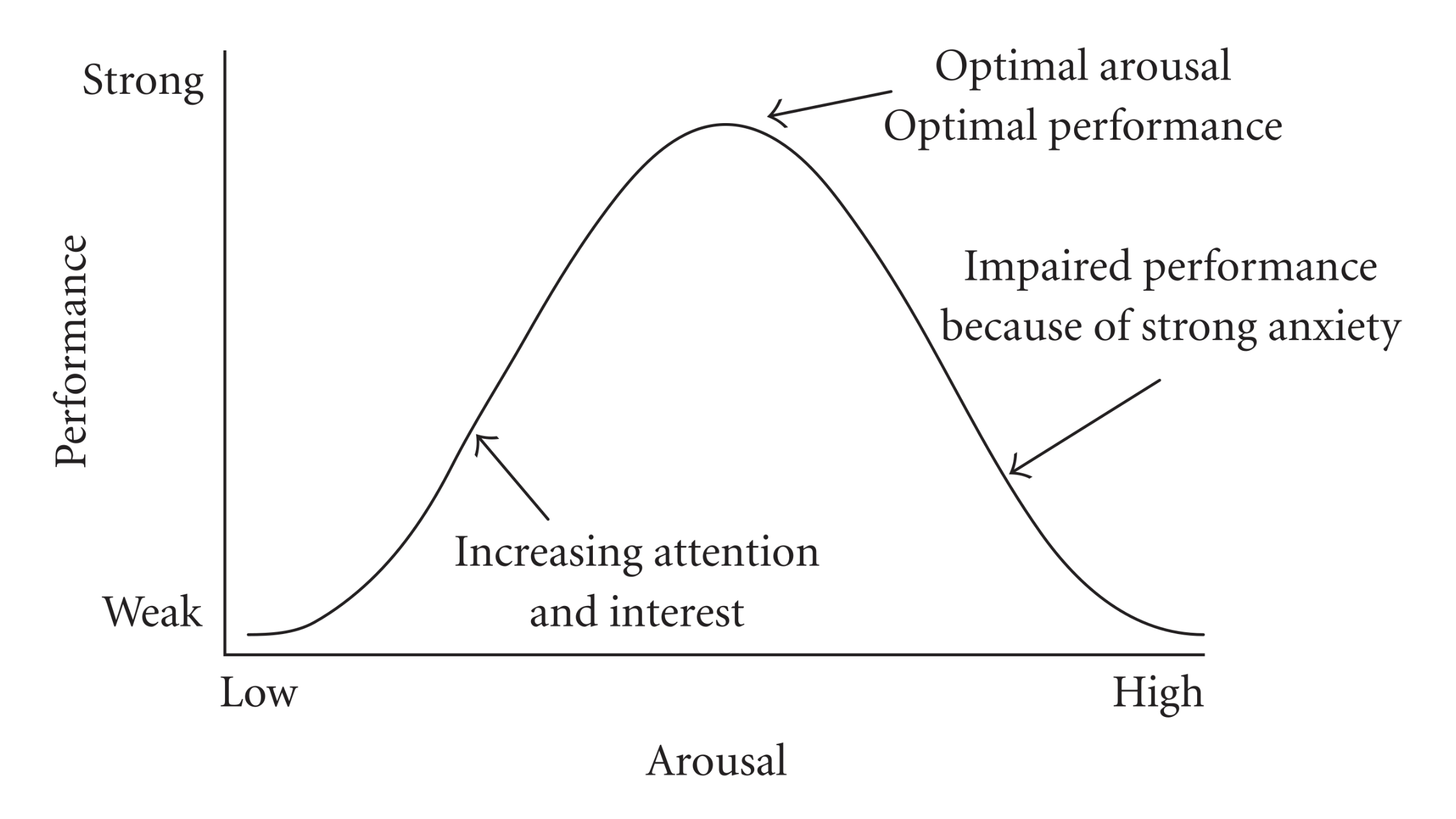Stress Can Be Good for You. Here's How
 Stress is generally seen as an undesirable state to be avoided whenever possible. It feels bad, can interfere with attention and productivity, and, when experienced chronically, may harm the body and lead to mental illnesses, including depression and generalized anxiety.
Stress is generally seen as an undesirable state to be avoided whenever possible. It feels bad, can interfere with attention and productivity, and, when experienced chronically, may harm the body and lead to mental illnesses, including depression and generalized anxiety.
Despite stress’s bad reputation, its effects aren’t universally harmful, and there may be some downsides to a completely stress-free life. Learning when stress is good and why can help you identify when it might be working in your favor and when to get rid of it.
What Is Stress?
Before it’s possible to see how and why stress can be good, it’s important to understand what stress is.
Generally, when discussing mental health, we are referring to what’s called psychological stress, which is an ordinarily unpleasant feeling of arousal or tension you experience in response to a negative or challenging circumstance. For example, you may feel stressed about your looming work deadline or financial pressures.
Sometimes, when experts discuss the effects of stress, they are talking about physiological or biological stress, which refers to the physical changes that occur in the body in response to actual or perceived danger, such as an increased heart rate, dilated pupils, or the release of stress hormones.
‘Stress’ can also refer to circumstances or situations that cause or warrant stress. For example, we may say of someone, “They are dealing with a lot of stress right now,” when we mean they are in a stressful situation. Here, ‘stress’ is more synonymous with ‘pressure.’
Experts aren’t always clear about which type of stress they are referring to, though they often have psychological stress in mind.
What is Stress Good for?
There is a reason our bodies evolved a stress response, and it’s not because feeling stressed is always bad for us. When experienced in moderate amounts for short periods.
Stress Serves as a Wellness Threat Detector
Perhaps one of the most obvious benefits of stress is that it can direct our attention toward and make us care about threats to our well-being. If your ancestors didn’t feel stressed when encountering a dangerous animal in the wild, they might not have known or felt compelled to avoid or attack it.

While the nature of the threats may have changed, our danger detection system lives alive and well in our feelings of psychological stress. They remain an important signal from our bodies that a situation or something about it might be bad for us.
Stress Can Improve Performance
Having no stress at all isn’t always a good thing when it comes to skills and tasks. According to the Yerkes-Dodson Law, optimal performance occurs between no pressure and high pressure in a goldilocks zone, where attention, motivation, and alertness are increased. For example, while a next-day deadline might result in crippling anxiety that prevents you from making progress, no deadline at all might mean you never complete the project. Stress Can Enhance Your Memory
Stress Can Enhance Your Memory
In some instances, our brains appear to respond to stressful experiences by growing or reorganizing in a phenomenon known as neuroplasticity to better respond to similar situations in the future.
 Memory is a good example of this. Animal studies show the brains of mice that underwent a stress test grew new neurons and performed better on learning and memory tests. Dr. Daniele Kaufer, an associate professor at UC Berkeley who studies the biology of stress, shares:
Memory is a good example of this. Animal studies show the brains of mice that underwent a stress test grew new neurons and performed better on learning and memory tests. Dr. Daniele Kaufer, an associate professor at UC Berkeley who studies the biology of stress, shares:
“[This] makes sense from an adaptive point of view.[…] If an animal encounters a predator and manages to escape, it’s important to remember where and when that encounter happened to avoid it in the future. If you’re walking down an alley and somebody threatens you, it’s important to remember exactly where you were in order to avoid that alley in the future.”
Stress Can Build Your Stress-Resilience Muscles
Stress is often a challenging, unpleasant experience. While we’d all like to avoid it as much as possible, the reality is that no life is stress-free. So how do we learn to manage it better?
As with any skill, practice is essential. In the case of stress, repeated exposure to a particular stressor can reduce how stressed it makes you feel over time. This response pattern forms the basis of one of the most commonly utilized psychological therapies, called exposure therapy, which encourages individuals to confront a fear or obsession until it becomes more tolerable.
“Stressful experiences can help you learn how to better cope with stress in the future,” shares Andrea Marquez LCSW, an Austin-Texas-based therapist here at Heading Heading. “They can show you what you’re capable of managing on your own so that the next time you encounter the same stressor, you’re better able to respond to it calmly and effectively.”
Stress Can Strengthen Your Immune System
 Perhaps more surprising than the beneficial effects of stress on the mind are its healing effects on the body. While we can get an intuitive sense of how stress might help us prepare for danger or feel extra motivated to complete tasks, it’s a little harder to see how it might benefit us at a biological level.
Perhaps more surprising than the beneficial effects of stress on the mind are its healing effects on the body. While we can get an intuitive sense of how stress might help us prepare for danger or feel extra motivated to complete tasks, it’s a little harder to see how it might benefit us at a biological level.
Despite this, researchers argue that stress can be good for the body. For example, experiments have revealed that acute, short-term stress can improve immune responses to vaccinations, woundings, and infections.
How Do I Know When Stress is Good or Bad?
While stress can improve memory, attention, immune function, stress tolerance, and more, it can do just the opposite. Whether or not a particular stressful feeling or circumstance is beneficial will ultimately depend on several individual factors, meaning there’s no one-size-fits-all test for separating the good stress from the bad. However, there are a few good rules of thumb.
It Didn’t Last For A While
The benefits of stress are limited to brief exposures to it. If the stress you are feeling is sustained, it may be doing more harm than good.
It Stops When the Stressor is Gone
Stress that sticks around after the danger or threat is gone is typically bad news.
It Feels Good
 While stress usually feels bad, it isn’t always an unpleasant experience. For example, the stress of a workout may feel pleasurable. So, if the pressure you are experiencing feels good, that’s a sign that it might be good for your mind and body.
While stress usually feels bad, it isn’t always an unpleasant experience. For example, the stress of a workout may feel pleasurable. So, if the pressure you are experiencing feels good, that’s a sign that it might be good for your mind and body.
You Feel Competent, Capable, and In Control
Stress tends to be less pronounced, shorter, and more beneficial when we have positive beliefs about our ability to problem solve in general or for the specific situation that is causing us stress.
You Feel Motivated But Not Overwhelmed
 As we learned from the Yerkes-Dodson Law, some stress is necessary for optimal performance. But how much is suitable for any person depends on various factors from skill level to personality to confidence. So how much is enough for you?
As we learned from the Yerkes-Dodson Law, some stress is necessary for optimal performance. But how much is suitable for any person depends on various factors from skill level to personality to confidence. So how much is enough for you?
“A good rule of thumb is that you feel motivated but not overwhelmed,” shares Patricia Hernandez LCSW. “That way, you’ll have the energy to complete your tasks without the harmful effects of rumination and anxiety.”
You Have a Strong Social Support Network
Social support can help ensure stress has a positive impact in various ways. For one thing, a solid social group can help you feel in control of your circumstances and better able to handle whatever stressors come your way. On top of that, social interactions can cause the release of oxytocin, which research suggests protects against the adverse effects of stress.
You’re in a Stressful Situation
Feelings and emotions can be warranted or appropriate. For example, it “makes sense” to feel happy when something is good for you. We can evaluate stress in the same way. If you are stressed about genuinely stressful situations, then it’s more likely to be of the helpful variety. However, if your stress seems out of line with your circumstances, it’s probably not doing you any favors.
Takeaway
While stress is often an uncomfortable, harmful feeling, we experience it for a reason. As a result, it’s no surprise that there’s a positive side to stress. For example, it can:
- Alert you to threats to your well-being
- Improve your alertness, motivation, and overall performance
- Enhance your memory
- Increase your stress resilience
- Improve your immune function
The problem with stress is that it can hurt the same things it helps, raising the question, how do you know when stress is good? Stress is more likely to be beneficial when:
- It doesn’t last for long
- It goes away when the stressor is gone
- It feels good
- You feel competent and capable
- You feel motivated but not overwhelmed
- You have a solid social support system
- You’re in a genuinely stressful situation
Want to find out if Heading is right for you?
Complete our consultation form and an intake specialist will get in touch.

